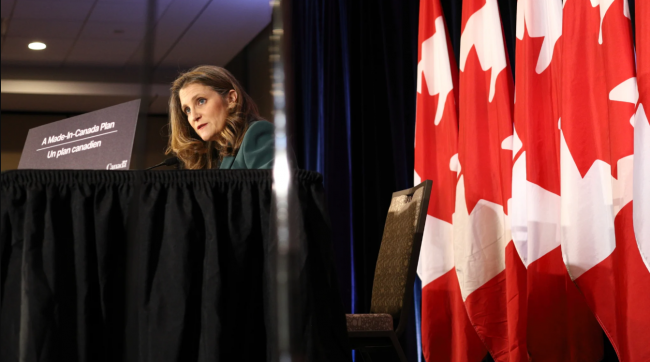Articles Menu

Mar. 13, 2024
A majority of Canadians want Prime Minister Justin Trudeau’s government to implement a windfall tax on oil and gas companies’ profits, according to a new poll.
The findings from Leger come approximately one month before the federal government unveils its next budget. Before the budget is unveiled, environmental advocacy groups are urging Finance Minister Chrystia Freeland to respond to public support by taxing the record profits of the fossil fuel sector.
According to the polling, conducted in early March, a whopping 62 per cent of Canadians say Canada should introduce a tax on the oil and gas sector’s record profits, with only 21 per cent disagreeing.
Support for a windfall tax varies significantly by region. But in seat-rich Quebec and Ontario, where Trudeau must perform well to secure a fourth term, support is the highest at 70 per cent and 64 per cent, respectively. The Leger results found every region of the country sees a majority supporting a windfall tax, with the lowest being 53 per cent support in Alberta.
In a recent interview, University of Victoria associate professor James Rowe told Canada’s National Observer that the Liberals are looking to link their climate action with affordability concerns in an attempt to combat Conservative Leader Pierre Poilievre’s rise in the polls. Rebranding the carbon price is part of that effort, but beyond rebrands, Rowe said the Liberals need to genuinely respond to kitchen-table concerns.
A windfall tax on oil and gas companies is one way to achieve that, Rowe said.
“I think they're worried about being labelled as the tax-and-spend Liberals in an inflationary environment, but I think part of that is rooted in a bit of a misdiagnosis around the inflation problem,” he said. “There's really good research showing corporate price-gouging is playing a really significant role.
“Given the role of corporate price-gouging, there's ways the government could be more actively addressing [inflation] than just lecturing grocery store CEOs,” he said. “Trying to drive down prices with things like windfall profit taxes across the economy in sectors that are benefiting considerably from this high price environment, whether that's price-gouging or because they're just benefiting from war, in the case of oil and gas companies.”
Rowe added that if the Liberals propose ambitious action to drive down inflation using tools like a windfall profit tax, it could help address the affordability concerns that are driving voters into the arms of the Conservatives.
A majority of Canadians want Prime Minister Justin Trudeau’s government to implement a windfall tax on oil and gas companies’ profits, according to a new @leger360 poll. #cdnpoli - Twitter
"Momentum is building for a windfall profit tax on oil and gas companies’ excessive profits,” said David Suzuki Foundation senior climate adviser Tom Green in a statement. “It’s easy to see why: the fossil fuel industry has made the affordability crisis harder for people while making out like bandits.
“We know decision-makers are under pressure to cut spending but we must invest in a sustainable future for the next generation,” he said. “Making polluters pay in this year’s federal budget would release billions of dollars in funding for essential climate solutions and nature protection.”
According to the Parliamentary Budget Officer (PBO), a one-time tax of 15 per cent on oil and gas companies making over $1 billion in taxable income could rake in an additional $4.2 billion for the federal government over five years. For its analysis, the PBO applied the Canada Recovery Dividend — a windfall tax Ottawa slapped on banks and insurance companies last year — to fossil fuel companies.
Other countries have already adopted excess profit taxes on the fossil fuel sector. This month, the United Kingdom extended its windfall tax — first applied in 2022 during Russia’s invasion of Ukraine — out to 2029. Other countries with a similar tax include the Czech government taxing energy companies at 60 per cent and imposing revenue caps, a 50 per cent tax in Italy, and 33 per cent taxes in Germany and the Netherlands, all of which are substantially higher than the PBO assumption of 15 per cent.
Endorsing the call for a windfall profit tax, Centre for Future Work director Jim Stanford said in a statement that “sky-high” oil and gas profits “were the biggest single factor causing recent high inflation in Canada.”
He added that fossil fuel profits were $30 billion higher last year than in the year before the pandemic, representing significantly more than $4 billion in excess grocery store profits over that same period, which “rightly generated such public anger,” he said. “It’s time Canadians turned their attention to the much larger excess profits being captured by the oil and gas giants.
“An excess profits tax on [the] petroleum sector, similar to measures already applied to banks and insurance companies, would be a fair and efficient way to redistribute those inflationary profits back to hard-pressed Canadian consumers,” he said. “It would be good for the planet and good for the economy.”
Freeland’s press secretary Katherine Cuplinskas did not answer questions about whether a windfall profit tax is being considered. Instead, she said, “Our economic plan is about building more homes, faster, making life more affordable, and creating more good jobs.”
Climate Action Network Canada executive director Caroline Brouillette said oil and gas profits are directly related to the affordability issues Canadians are facing.
“During a year when temperature records are being smashed, we cannot allow CEOs and shareholders to get richer and richer from climate destruction,” she said in a statement.
“We urge Minister Freeland to listen to what Canadians want and introduce a tax on windfall oil and gas profits in Budget 2024.”
[Top photo: Deputy Prime Minister and Minister of Finance Chrystia Freeland takes questions from reporters before tabling Budget 2023 on March 28 at the Westin Hotel in Ottawa. Photo by Natasha Bulowski]